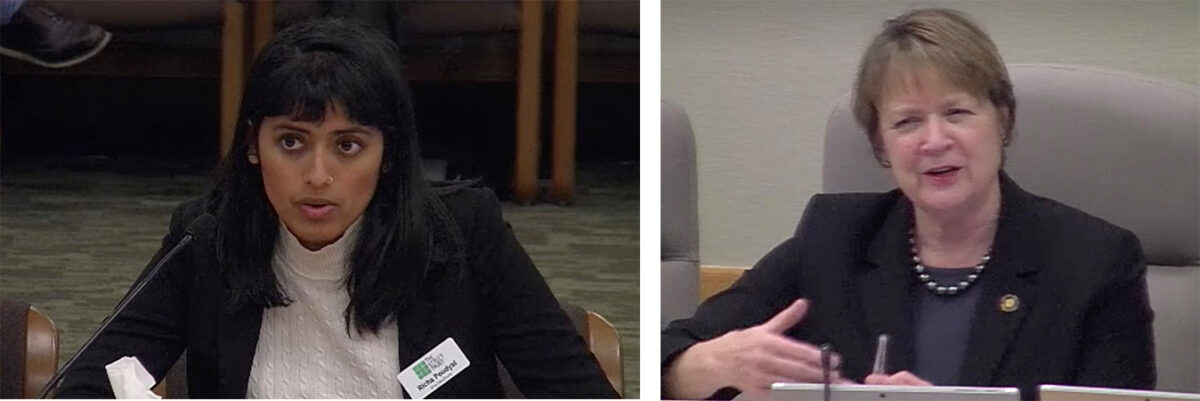
Earlier this month a pair of bills that would give cities across Oregon more authority to set speed limits on local streets got their first hearing in front of lawmakers at the state capitol in Salem.
There was no vote taken on either Senate Bill 558 or House Bill 2702 at the Joint Transportation Commitee on March 6th; but the conversation between advocates, lobbyists, agency staff, and lawmakers was notable. Especially an exchange about “traffic violence”.
“When you use the word ‘violence,’ it makes me think something intentional has occurred, and I’d question the use of that word.”
— Rep. McKeown, Transportation Committee Co-Chair
First, the bills. SB 558 is the statewide expansion of a bill passed in 2017 that gave the City of Portland authority to lower residential speed limits by 5 mph. HB 2702 would give City of Portland authority to set speed limits on all the roads — including arterials — in its jurisdiction. This would be a major victory in the Portland Bureau of Transportation’s war on speeding.
The Oregon Department of Transportation (ODOT) currently has authority over speed limits on all streets in the state. But as we know all too well, ODOT’s driving-centric perspective colors their decision-making and they often care more about maintaining driving speeds than keeping all road users safe. Part of that is because they rely on outdated and dangerous methodologies for speed-setting like the 85th percentile rule — which means the faster people drive, the higher the speed limit.
Thankfully it appears ODOT is aware things need to change.
“Maybe the historic practice that we’ve been using [to set speeds] doesn’t necessarily fit the context of what our current transportation system is,” said ODOT Highway Division Manager Kris Strickler at the outset of the hearing. “And maybe what the future of that transportation system is, and are there other ways to look at speed setting as we start to look at this future.”
While ODOT gets pressure from truckers and freeway drivers to keep speeds limits high, it’s a different story in cities like Portland.
PBOT Active Transportation and Safety Division Manager Catherine Ciarlo was at the hearing. She told lawmakers her mandate is Vision Zero, which requires nothing less than an end to fatalities and serious injuries. “It’s something [City] Council takes seriously and the public leans on us very hard about, so we really are trying to organize our management of the roadway system to achieve that,” Ciarlo told lawmakers.
Then Ciarlo made the case for change: “There’s pretty strong national research coming out that — especially in the urban context — the historic way of setting speeds has not had good safety outcomes.”
A major PBOT ally on HB 2702 is the City of Eugene. Their City Engineer Matt Rodrigues testified that, “If you keep using 85th percentile as an approach, the 85th percentile speed will keep going up.”
Advertisement
HB 2702 wouldn’t give cities carte blanche. It would have a series of parameters in place like the requirement of certified engineers, requirements for consistency and adherence to a methodology laid out in adopted rule, a close partnership with ODOT, and so on.
House Rep. Rob Nosse is the bill’s main sponsor. Perhaps concerned that ODOT will be reluctant to give up speed-setting authority, he called the bill a “partnership approach” that would, “Allow willing [as in, cities would opt-in] local jurisdictions to implement context-informed speeds on their roads in consultation with ODOT.”
When it came time for open testimony, the first person to step up with The Street Trust’s new Advocacy Director Richa Poudyal. Her organization is strongly in favor of the bills. “We work with Families for Safe Streets… who’ve been driven to working against traffic violence after they’ve lost family and loved ones to violence on the roads.”
That reference to “violence” caught Transportation Committee Co-Chair Rep. Caddy McKeown by surprise. “When you use the word ‘violence,’ it makes me think something intentional has occurred [shaking her head], and I’d question the use of that word. Can you explain it to me?” (Co-Chair Sen. Lee Beyer interjected, “Is that like road rage?”).
Poudyal then responded: “My usage of the term ‘traffic violence’ is really to address the impact to the people who die, who suffer injury. There is violence inflicted on them. It wasn’t intended to speak toward any intention on the drivers’ part or anyone who inflicts that harm.”
I asked both McKeown and Poudyal about this exchange via email after the hearing. I didn’t hear back from Rep. McKeown.
Poudyal said,
“We want to use language that challenges the notion that deaths of pedestrians and cyclists are ‘accidents’, that there is not much to be done to prevent them, or that it is normal that they happen as frequently as they do. Referring to fatalities and serious injuries as traffic violence rather than accidents more accurately reflects the actual impacts – losing lives – and helps to challenge complacency of drivers not being cautious.”
As for Rep. McKeown’s discomfort with the term, Poudyal said she feels it reflects a common feeling that many of us who drive worry about the vast responsibility that comes with it.
“It’s important to begin to shift the way we talk about traffic violence in order to begin to really value people’s lives over efficiency and speed,” she added.
It will be interesting to see how these bills fare. Stay tuned.
— Jonathan Maus: (503) 706-8804, @jonathan_maus on Twitter and jonathan@bikeportland.org
Never miss a story. Sign-up for the daily BP Headlines email.
BikePortland needs your support.


